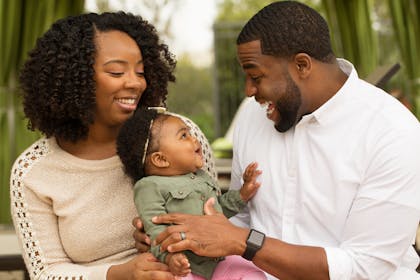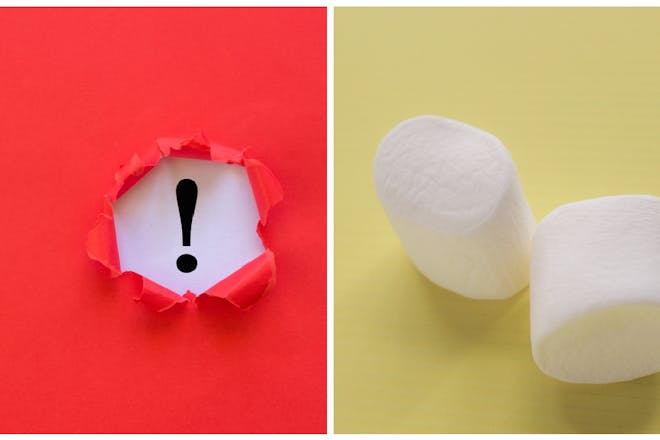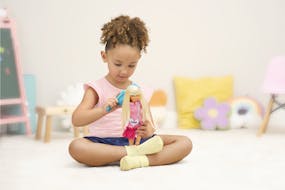Babies start learning about language from the moment they are born through your interactions with them. We have some expert tips on how you can boost your child's early language – from playing interactive games with your baby, to nurturing your older child's confidence through creativity.
It's never too early to focus on improving your child's early language skills. Education begins long before your child enters a classroom. In fact, from the moment they're born, your baby's education has already begun ...
This is because every single day your baby is interacting with you and other caregivers, and this all contributes to them learning how to talk!
We've gathered some great tips on how you can make interactions with your baby fun and engaging, and help everyone to enjoy supporting your baby’s early learning experiences.
FREE NEWBORN NAPPIES
We've got some top tips on how you can help your child express themselves in their earliest years, from Tracy Jackson, the Head of Early Years at the National Literacy Trust, and Dr Kirsten Asmussen, the Head of Child Development at the Early Intervention Foundation.
Here's what they shared:
Babies
- Follow the leader : Make the most of the times your little one is keen to copy your facial expressions – try sticking your tongue out, blinking or making lip sounds for added engagement. This also goes both ways. Copy the sounds your baby makes. Say back to them what they are trying to tell you through their noises.
- It’s good to talk : Back-and-forth conversation between parents and children increases vocabulary skills and language development. Whether they can use any words yet or not, respond to your baby’s babbling and facial expressions as if they are starting a conversation. A good place to start is to notice what your baby is looking at and talk about that.
- Everyone loves a surprise: While playing with your child, following predictable routines is important but so is an element of surprise in your playtime. ‘Body’ or ‘lap’ games that include tickling or touch, such as ‘incy-wincy spider’ or ‘koochy-koo’ are exciting and stimulating for babies and small children.
- A gesture speaks a thousand words: As your baby grows, they will start to develop gesturing and joint engagement – where they look to where you point. To encourage this key developmental stage, respond to your baby’s gestures make lots of your own actions when you speak – use gestures and actions to help your child understand what you say, eg saying “bye bye” and waving.
- The face is an open book: From a very early age, a baby can recognise the difference between happy and sad faces and can copy simple facial movements. By six months, they can typically express a range of emotions such as pleasure, fear and excitement through facial expressions, vocalisations and body language. You can encourage them to express themselves by describing your baby’s emotions as you speak to them.
Young Children
- Book-sharing and reading : Reading with them is a key way to develop a closer connection, encouraging your child’s imagination to grow by introducing them to new words. Look at the pages together, talk about the pictures, and follow your child’s focus. Try reading to them first, and then, as your child gets older, encourage them to be more involved, first by having them turn the pages, then by discussing the story with them.
- Make daily routines fun: Your little one is constantly seeing and experiencing new things, and so the weekly trip to the supermarket is a whole new world to explore. This is a chance to point new things out and name things. As soon as you notice your child looking or pointing at something, talk about it before their attention moves on to something else – that might be within a couple of seconds for babies – and this can reinforce language skills.
- Time to rhyme: Songs, poems and rhymes are enjoyed by children from a very early age. The repetition, language, sounds and rhythm, help children to predict what’s coming next. From as early as one month, sing songs and rhymes to your baby with actions or lots of repetition. Once your child is a few years old, play rhyming games with them – can your child come up with a word that rhymes with “cat”?
- It’s all make - believe: Once your baby becomes a toddler, they begin to understand what they can’t see – to be able to pretend and think about the future. Make-believe games and conversations about feelings and memories are associated with children’s vocabulary development and expressive language use. Play make-believe games together or games which use opposites such as on or off, big or little. Also encourage your child to talk about the future and anticipate events.
- Ask a question or two: We are all familiar with the “why” questions from curious toddlers, but you can ask the questions, too. Use open questions with lots of possible answers. “What are you going to play with today?”, “How do you think the character will solve the problem?” Ask your child if they can give possible solutions to problems, for example if their favourite hat is missing. All this helps a child understand the past, present and future and use their memory skills.
They say, 'Every child is different and there’s no one-size-fits-all. What matters most is spending time with your child chatting, playing, and reading. Every little thing you do with them will set them up well as keen little learners for when they start school.'
For more information visit ‘ Start for Life – chat, play, read ’ where you can find tips and activities to help support your child's development and find further support in your local area.
Related stories
What you need to know about bedtime routines for babies
CHAT: From birth to 12 months - Find answers to all your questions!
Your guide to baby-led weaning
Need advice?
Our health visitors and nursery nurses are online Monday to Friday evenings to answer your queries on feeding, sleep and child health.








